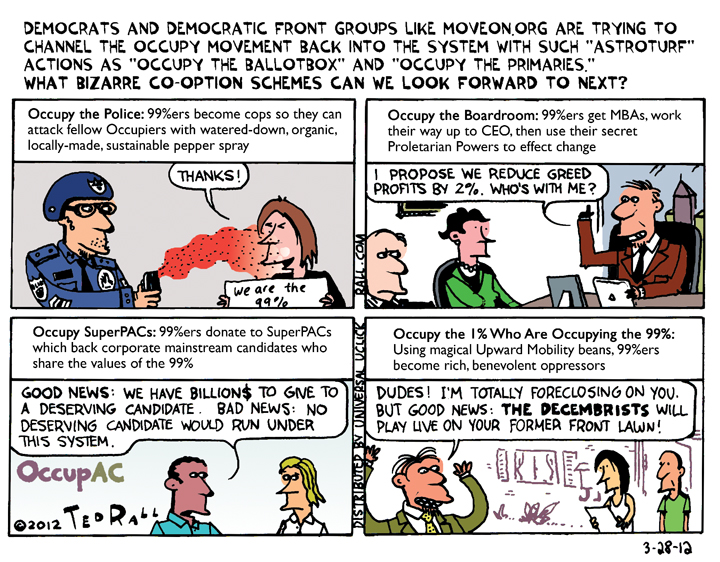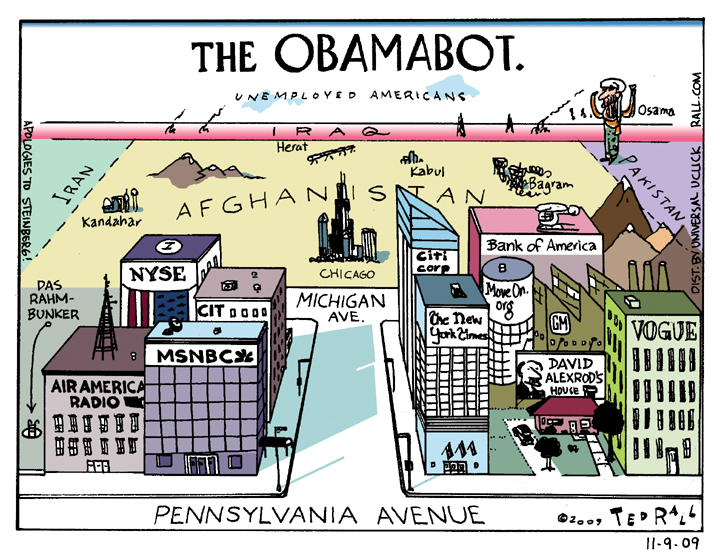Why Occupy Wall Street Still Matters
It was the middle of September. An ad hoc coalition of political groups, mostly left of center but not all, whose members mostly were young but not all, came together to express their opinions outside the officially approved two-party paradigm.
United by their anger and energy, these people held general assemblies (they called them “sit-ins.”) They marched. Throughout that fall and into part of the following year, they caught the attention of the news media, inspiring activists around the country. In the end, the powers that be did what power powers that be usually do: they sent in the cops. Beaten and swept away in mass arrests, the young activists drifted away. Voters, convinced by the system’s propaganda that the movement threatened law and order, turned to the right.
One year later, it was clear to most that the Free Speech Movement at UC Berkeley had failed.
Students had demanded that school administrators allow political organizations, including civil rights groups, to table and solicit contributions on campus. (In 1964 only the campus Democratic and Republican clubs were allowed to do so.) There was a concession: the acting chancellor grudgingly opened the steps of a single building for open discussion and tables, but only during certain hours. By the fall of 1966, however, UC had a new right-wing president and California was led by a new right-wing governor, Ronald Reagan, who had promised to “clean up the mess in Berkeley.”
Now we understand that the FSM was a prequel to a beginning. The FSM morphed into a campus movement that inspired widespread social unrest of the 1960s that centered on opposition to the Vietnam War. Everything that followed–feminists burning bras, gays rioting after the bust at the Stonewall Inn, America’s withdrawal from Vietnam–had its roots in that “failed” movement.
Keep the “failed” Free Speech Movement in mind as you read and watch this week’s coverage of the anniversary of Occupy. One year after activists set up the first Occupy Wall Street encampments in New York and Washington, D.C., the Occupy movement is described as in “disarray.” Indeed, it’s hard to remember how big OWS was. Were there really more than a thousand Occupations? Did 59% of the American public support OWS when it was barely a month old? What happened?
“I think they’re idiots. They have no agenda,” Robert Nicholson, who works on Wall Street, tells The Los Angeles Times. “They have yet to come out with a policy statement.”
“The movement [grew] too large too quickly. Without leaders or specific demands, what started as a protest against income inequality turned into an amorphous protest against everything wrong with the world,” argues the AP.
I was at Freedom Plaza in D.C. and Zuccotti Park in Manhattan. I’m a member of my local Occupy chapter on Long Island, Occupy the East End. (Yes, we’re still around.) I agree with Mikell Kober of Brooklyn, who was protesting in front of a Bank of America branch. She told a reporter that OWS is “about creating a public space where people could gather and have a conversation about the things that need to change.”
Coming up with a list of demands isn’t the point. Thinking outside the D vs. R box is. Now people know that electoral politics is theater. Real politics is in the streets. For the first time since the Sixties, we know that.
The flaw in Occupy, the seed of its future destruction, was its basic original premise: occupying public space nonviolently.
Occupying nonviolently is an oxymoron. If you decide to be nonviolent, you leave peacefully when the police show up to evict you. Which is what happened last winter to the OWS encampments. If you are determined to occupy–and remain in–public space, you must resort to violence in order to defend yourselves from police violence.
OWS ought to have decided whether it wanted to be nonviolent or whether it wanted to occupy public space. If it chose nonviolence, it could have engaged in acts of resistance–flash mobs, demonstrations, strikes–that did not require setting up and defending encampments.
Also, a political movement is defined more by what it is not than by what it is. OWS was a movement outside of the duopoly, yet many “Occupiers” worked with, and got co-opted by, Democratic Party front groups like MoveOn.org who stole OWS’ “We are the 99%” slogan.Though the physical presence of OWS is a mere shadow of its presence a year ago, the Occupy idea remains colossally important–largely because the two major parties still refuse to engage the biggest problem we face: America’s growing poverty. “I don’t think Occupy itself has an enormous future,” Dr. Mark Naison, a professor at Fordham University, told the Associated Press. “I think that movements energized by Occupy have an enormous future.”
Like the Free Speech movement nearly a half century ago, Occupy is the prequel to the beginning.
Of course, change doesn’t always mean progress and inspiration isn’t always positive. “Reagan’s political career owed a lot to the [FSM] people who used the [UC] campus as a radical base for political activity. It is an irony that helped elect him,” says Earl Cheit, executive vice chancellor at Berkeley from 1965 to 1969.
(Ted Rall‘s new book is “The Book of Obama: How We Went From Hope and Change to the Age of Revolt.” His website is tedrall.com. This column originally appeared at NBCNews.com’s Lean Forward blog.)
COPYRIGHT 2012 TED RALL


